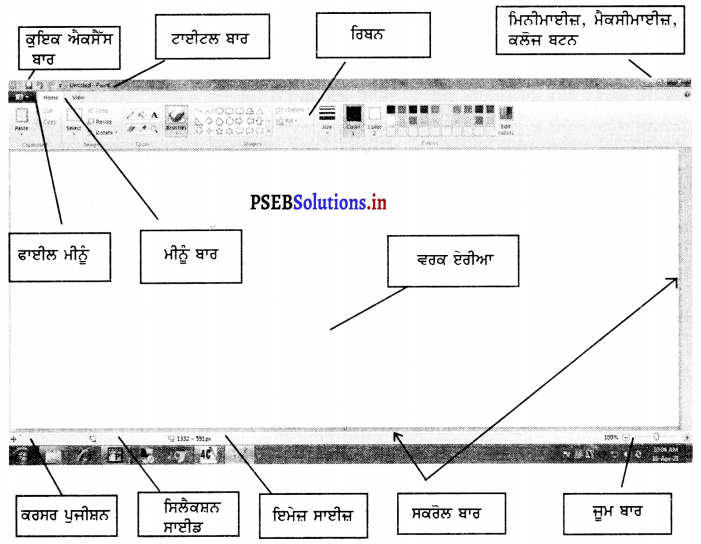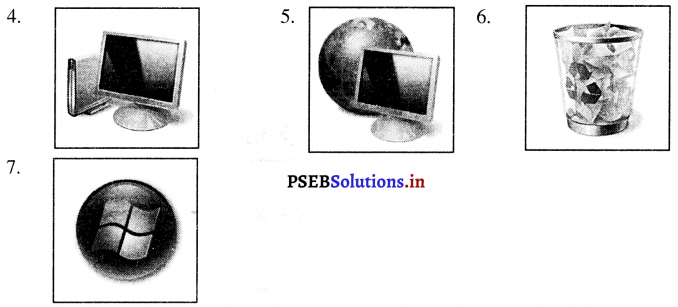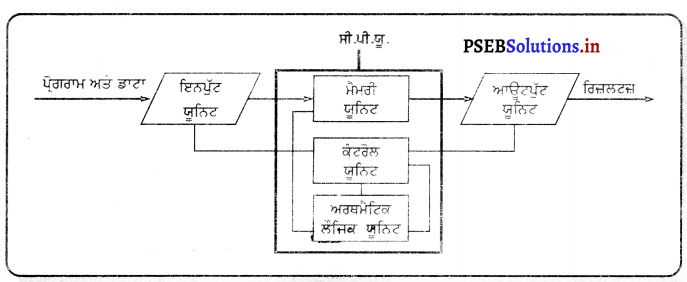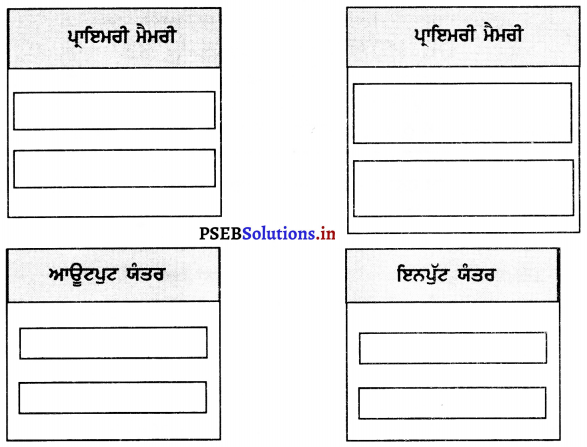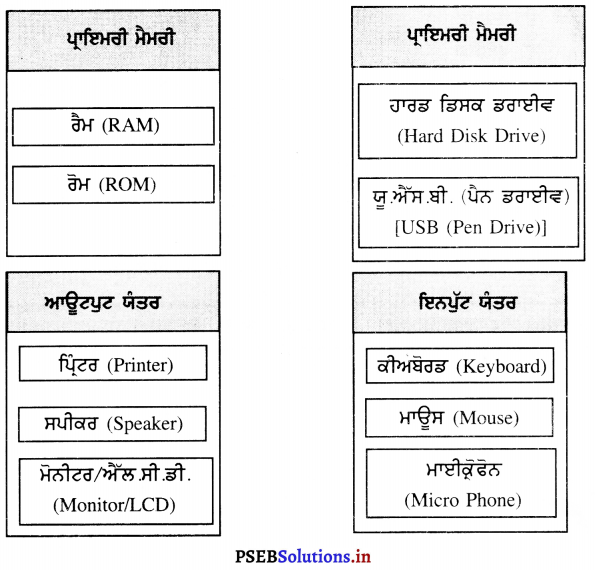Punjab State Board PSEB 6th Class Computer Book Solutions Chapter 5 ਤੇ ਐੱਮ. ਐੱਸ. ਪੈਂਟ (ਭਾਗ-2) Textbook Exercise Questions and Answers.
PSEB Solutions for Class 6 Computer Chapter 5 ਤੇ ਐੱਮ. ਐੱਸ. ਪੈਂਟ (ਭਾਗ-2)
Computer Guide for Class 6 PSEB ਤੇ ਐੱਮ. ਐੱਸ. ਪੈਂਟ (ਭਾਗ-2) Textbook Questions and Answers
ਅਭਿਆਸ ਦੇ ਪ੍ਰਸ਼ਨ-ਉੱਤਰ
1. ਖ਼ਾਲੀ ਥਾਂਵਾਂ ਭਰੋ
(i) ਕਲਿੱਪ ਬੋਰਡ ਨੂੰ ਵਿੱਚ ਤਿੰਨ ਆਪਸ਼ਨਾਂ ਮੌਜੂਦ ਹੁੰਦੀਆਂ ਹਨ-Cut, Copy ਅਤੇ ………………..
(ਉ) Paste
(ਅ) Move
(ੲ) Close
(ਸ) Zoom.
ਉੱਤਰ-
(ਉ) Paste
(ii) ਟੌਪ ਬਟਨ (Top Button) ਜਿਸ ਦੇ ਆਈਕਨ ਵਿੱਚ ਡਾਇਮੰਡ ਸ਼ੇਪ ਵਿੱਚ ਲਾਈਨ ਹੁੰਦੀ ਹੈ, ……………….. ਟੂਲ ਹੁੰਦਾ ਹੈ ।
(ਉ) ਪੇਸਟ (Paste)
(ਅ) ਕੱਟ (Cut)
(ੲ) ਕਾਪੀ (Copy)
(ਸ) ਕਰੌਪ (Crop)
ਉੱਤਰ-
(ਸ) ਕਰੌਪ (Crop)
(iii) ………….. ਟੂਲ ਦੀ ਵਰਤੋਂ ਪੈਂਟਾਗਨ ਡਰਾਅ ਕਰਨ ਲਈ ਕੀਤੀ ਜਾਂਦੀ ਹੈ !
(ਉ) ਟਰੈਂਗਲ (Triangle)
(ਅ) ਰਿਕਟੌਗਲ (Rectangle)
(ੲ) ਪੈਂਟਾਗਨ (Pentagon)
(ਸ) ਹੈਕਸਾਗਨ (Hexagon) ।
ਉੱਤਰ-
(ੲ) ਪੈਂਟਾਗਨ (Pentagon)
![]()
(iv) ਇਰੈਜ਼ਰ ਟੂਲ ਦੀ ਮੱਦਦ ਨਾਲ ਤਸਵੀਰ ਦੇ ਕਿਸੇ ਭਾਗ ਨੂੰ ਮਿਟਾਉਣ ਲਈ ਮਾਊਸ ਦਾ …………………. ਬਟਨ ਦੱਬਿਆ ਜਾਂਦਾ ਹੈ ।
(ਉ) ਲੈਫਟ (Left)
(ਅ) ਰਾਈਟ (Right)
(ੲ) ਸਕਰੌਲ (Scroll)
(ਸ) ਇਹਨਾਂ ਵਿਚੋਂ ਕੋਈ ਨਹੀਂ ।
ਉੱਤਰ-
(ਉ) ਲੈਫਟ (Left)
(v) ਜਦੋਂ ਮਾਊਸ ਦਾ ……………………… ਬਟਨ ਦੱਬਿਆ ਜਾਵੇ ਤਾਂ ਕਲਰ-2 ਦੀ ਵਰਤੋਂ ਕੀਤੀ ਜਾਂਦੀ ਹੈ ।
(ਉ) ਲੈਫਟ (Left)
(ਅ) ਰਾਈਟ (Right)
(ੲ) ਸਕਰੌਲ (Scroll)
(ਸ) ਇਹਨਾਂ ਵਿਚੋਂ ਕੋਈ ਨਹੀਂ ।
ਉੱਤਰ-
(ਅ) ਰਾਈਟ (Right)
2. ਬਹੁਤ ਛੋਟੇ ਉੱਤਰਾਂ ਵਾਲੇ ਪ੍ਰਸ਼ਨ
ਪ੍ਰਸ਼ਨ 1.
ਕਿਹੜੇ ਟੂਲ ਦੀ ਵਰਤੋਂ ਡੱਬਾ (Square) ਬਨਾਉਣ ਲਈ ਕੀਤੀ ਜਾਂਦੀ ਹੈ ?
ਉੱਤਰ-
ਨੈੱਕਟੌਗਲ ਟੂਲ ।
ਪ੍ਰਸ਼ਨ 2.
ਕਿਹੜੇ ਟੂਲ ਦੀ ਵਰਤੋਂ ਤਸਵੀਰ ਦੇ ਕਿਸੇ ਭਾਗ ਨੂੰ ਮਿਟਾਉਣ (erase) ਲਈ ਕੀਤੀ ਜਾਂਦੀ ਹੈ ?
ਉੱਤਰ-
ਇਰੇਜ਼ਰ ਟੂਲ ।
ਪ੍ਰਸ਼ਨ 3.
ਕਿਹੜਾ ਟੂਲ ਤਸਵੀਰ ਨੂੰ ਵੱਡਾ ਕਰ ਕੇ ਦੇਖਣ ਲਈ ਵਰਤਿਆ ਜਾਂਦਾ ਹੈ ?
ਉੱਤਰ-
ਚੂਮ ਟੂਲ ।
ਪ੍ਰਸ਼ਨ 4.
ਕਿਹੜੇ ਟੂਲ ਦੀ ਵਰਤੋਂ ਸੁਤੰਤਰ ਲਾਈਨ (free-hand) ਲਗਾਉਣ ਲਈ ਕੀਤੀ ਜਾਂਦੀ ਹੈ ?
ਉੱਤਰ-
ਪੈਂਨਸਿਲ ਟੂਲ ।
![]()
ਸ਼ਨ 5.
ਕਿਹੜੇ ਟੂਲ ਦੀ ਵਰਤੋਂ ਸਾਡੀ ਡਰਾਇੰਗ ਵਿੱਚ ਅੱਖਰ (text) ਸ਼ਾਮਿਲ ਕਰਨ ਲਈ ਕੀਤੀ ਜਾਂਦੀ ਹੈ ?
ਉੱਤਰ-
ਟੈਕਸਟ ਟੂਲ ।
3. ਛੋਟੇ ਉੱਤਰਾਂ ਵਾਲੇ ਪ੍ਰਸ਼ਨ
ਪ੍ਰਸ਼ਨ 1.
ਕਲਿੱਪ ਬੋਰਡ ਮੀਨੂੰ ਵਿੱਚ ਕਿਹੜੀਆਂ-ਕਿਹੜੀਆਂ ਆਪਸ਼ਨਾਂ ਹੁੰਦੀਆਂ ਹਨ ?
ਉੱਤਰ-
ਕਲਿੱਪ ਮੀਨੂੰ ਵਿੱਚ ਹੇਠ ਲਿਖੇ ਤਿੰਨ ਆਪਸ਼ਨ ਹੁੰਦੇ ਹਨ :
- ਕਟ
- ਕਾਪੀ
- ਪੈਸਟ ।
ਪ੍ਰਸ਼ਨ 2.
ਕਰੌਪ ਆਪਸ਼ਨ ਬਾਰੇ ਲਿਖੋ ।
ਉੱਤਰ-
ਕਰੌਪ ਆਪਸ਼ਨ ਆਪਣੀ ਤਸਵੀਰ ਨੂੰ ਕਰਾਪ ਕਰਨ ਲਈ ਵਰਤਿਆ ਜਾਂਦਾ ਹੈ । ਇਹ ਇਕ ਡਾਇਮੰਡ ਆਕਾਰ ਦਾ ਬਟਨ ਹੁੰਦਾ ਹੈ । ਇਸ ਦੀ ਵਰਤੋਂ ਨਾਲ ਸਿਰਫ ਚੁਣਿਆ ਹਿੱਸਾ ਹੀ ਬਚਦਾ ਹੈ ਬਾਕੀ ਹਿੱਸਾ ਕਟ ਹੋ ਜਾਂਦਾ ਹੈ ।
ਪ੍ਰਸ਼ਨ 3.
ਟੂਲ ਮੀਨੂੰ ਵਿੱਚ ਮੌਜੂਦ ਟੂਲਜ਼ ਦੇ ਨਾਂ ਲਿਖੋ ।
ਉੱਤਰ-
ਟੂਲ ਮੀਨੂੰ ਵਿੱਚ ਹੇਠ ਲਿਖੇ ਟੂਲਜ਼ ਮੌਜੂਦ ਹੁੰਦੇ ਹਨ :
- ਪੈਂਨਸਿਲ
- ਫਿਲ ਵਿਦ ਕਲਰ
- ਟੈਕਸਟ
- ਈਰੇਜ਼ਰ
- ਕਲਰ ਪਿਕਰ
- ਮੈਗਨੀਫਾਇਰ ।
ਪ੍ਰਸ਼ਨ 4.
ਸਾਈਜ਼ ਟੂਲ ਕੀ ਹੈ ?
ਉੱਤਰ-
ਸਾਈਜ਼ ਟੂਲ ਦੀ ਵਰਤੋਂ ਚੁਣੇ ਹੋਏ ਬੁਰਸ਼ ਦੀ ਲਾਈਨ ਦੀ ਮੋਟਾਈ ਚੁਣਨ ਵਾਸਤੇ ਕੀਤੀ ਜਾਂਦੀ ਹੈ । ਇਹ ਟੂਲ ਬੁਰਸ਼ ਦੀ ਚੋਣ ਕਰਨ ਤੋਂ ਬਾਅਦ ਹੀ ਐਕਟਿਵ ਹੁੰਦਾ ਹੈ ।
ਪ੍ਰਸ਼ਨ 5.
ਬੁਰਸ਼ ਬਾਰੇ ਲਿਖੋ ।
ਉੱਤਰ-
ਬੁਰਸ਼ ਇੱਕ ਅਜਿਹਾ ਟੂਲ ਹੈ ਜਿਸ ਦੀ ਵਰਤੋਂ ਨਾਲ ਤਸਵੀਰ ਵਿੱਚ ਵੱਖ-ਵੱਖ ਚੌੜਾਈਆਂ ਦੇ ਬੁਰਸ਼ ਟੈਕਸਚਰ ਦਾਖਿਲ ਕੀਤੇ ਜਾ ਸਕਦੇ ਹਨ । ਇਹ ਟੂਲ ਪੇਂਟਰ ਦੇ ਬੁਰਸ਼ ਵਾਂਗ ਹੀ ਟੈਕਸਚਰ ਪ੍ਰਦਾਨ ਕਰਦਾ ਹੈ ।
![]()
ਪ੍ਰਸ਼ਨ 6.
ਹੋਮ ਟੈਬ ਰਿਬਨ ਤੇ ਮੌਜੂਦ ਗਰੁੱਪਾਂ ਦੇ ਨਾਂ ਲਿਖੋ ।
ਉੱਤਰ-
ਹੋਮ ਟੈਬ ਰਿਬਨ ਵਿੱਚ ਹੇਠ ਲਿਖੇ ਗਰੁੱਪ ਮੌਜੂਦ ਹੁੰਦੇ ਹਨ :
- ਕਲਿਪ ਬੋਰਡ
- ਇਮੇਜ਼
- ਦੁਲਜ਼
- ਬੁਰਸ਼
- ਸ਼ੇਪਸ
- ਸਾਈਡ
- ਕਲਰ ।
4. ਵੱਡੇ ਉੱਤਰਾਂ ਵਾਲੇ ਪ੍ਰਸ਼ਨ
ਪ੍ਰਸ਼ਨ 1.
ਐਮ. ਐੱਸ. ਪੇਟ ਦੇ ਕਲਰ ਟੂਲ ਦੀ ਵਿਆਖਿਆ ਕਰੋ ।
ਉੱਤਰ-
ਰਿਬਨ ਦੇ ਕਲਰ ਸੈੱਕਸ਼ਨ ਦੇ ਤਿੰਨ ਭਾਗ ਹੁੰਦੇ ਹਨ-
- ਬਾਕਸ ਜੋ ਕਿ ਐਕਟਿਵ ਰੰਗ ਦਿਖਾਉਂਦੇ ਹਨ : ਕਲਰ-1, ਕਲਰ-2
- ਕਲਰ-ਪੈਲੇਟ
- ਐਡਿਟ ਕਲਰ ਬਟਨ ।
1. ਕਲਰ ਬਾਕਸ-
ਕਲਰ-1: ਕਲਰ-1 ਫ਼ੇਰਗਰਾਊਂਡ ਕਲਰ ਹੁੰਦਾ ਹੈ ਅਤੇ ਜਦੋਂ ਅਸੀਂ ਪੇਂਟ ਖੋਲ੍ਹਦੇ ਹਾਂ ਤਾਂ ਇਹ ਹਮੇਸ਼ਾਂ ਕਾਲਾ ਹੁੰਦਾ ਹੈ ।
ਕਲਰ-2 : ਕਲਰ-2 ਬੈਕਗਰਾਊਂਡ ਕਲਰ ਹੁੰਦਾ ਹੈ ਅਤੇ ਜਦੋਂ ਅਸੀਂ ਪੇਂਟ ਖੋਲ੍ਹਦੇ ਹਾਂ ਤਾਂ ਇਹ ਹਮੇਸ਼ਾਂ ਸਫ਼ੈਦ ਹੁੰਦਾ ਹੈ ।
2. ਕਲਰ ਪੈਲੇਟ – ਜਦੋਂ ਅਸੀਂ ਕੋਈ ਤਸਵੀਰ ਬਣਾਉਂਦੇ ਹਾਂ ਤਾਂ ਕਲਰ ਪੈਲੇਟ ਦੀਆਂ ਉੱਪਰਲੀਆਂ ਦੋ ਲਾਈਨਾਂ ਪੈਂਟ ਵਿੱਚ ਮੌਜੂਦ ਰੰਗਾਂ ਨੂੰ ਦਿਖਾਉਂਦੀਆਂ ਹਨ । ਹੇਠਾਂ ਵਾਲੀ ਖ਼ਾਲੀ ਸੁਕੇਅਰਜ਼ ਦੀ ਲਾਈਨ ਉਨ੍ਹਾਂ ਰੰਗਾਂ ਨੂੰ ਦਿਖਾਉਂਦੀ ਹੈ ਜਿਹੜੇ ਕਿ ਅਸੀਂ ਆਪਣੇ ਕੰਮ ਦੇ ਦੌਰਾਨ ਬਣਾਉਂਦੇ ਹਾਂ । ਜਦੋਂ ਅਸੀਂ ਇੱਕ ਵਾਰ ਪੇਂਟ ਦੀ ਵਿੰਡੋ ਨੂੰ ਬੰਦ ਕਰ ਦਿੰਦੇ ਹਾਂ ਤਾਂ ਬਣਾਏ ਗਏ ਰੰਗ ਖ਼ਤਮ ਹੋ ਜਾਂਦੇ ਹਨ ।
3. ਐਡਿਟ ਕਲਰ : ਐਡਿਟ ਕਲਰ ਬਟਨ ਸਾਨੂੰ ਐਡਿਟ ਕਲਰ ਡਾਇਲਾਗ ਬਾਕਸ ਵਿੱਚ ਲੈ ਜਾਂਦਾ ਹੈ ।
ਐਡਿਟ ਕਲਰ ਡਾਇਲਾਗ ਬਾਕਸ ਹੇਠ ਦਿਖਾਏ ਅਨੁਸਾਰ ਹੈ-

ਇੱਥੇ ਅਸੀਂ ਕਿਸੇ ਵੀ ਰੰਗ ਨੂੰ ਐਕਸਟੈਡਿਡ ਪੈਲੇਟ ਤੋਂ ਚੁਣ ਸਕਦੇ ਹਾਂ ਅਤੇ ‘Add to Custom Colors’ ਬਟਨ ‘ਤੇ ਕਲਿੱਕ ਕਰ ਸਕਦੇ ਹਾਂ । ਇੱਥੇ ਸਿਰਫ਼ ਇੱਕ ਰੰਗ ਨੂੰ ਹੀ ਪੈਲੇਟ ਦੇ ਹੇਠਲੇ ਸਕੁਏਅਰਾਂ ਵਿੱਚ ਸ਼ਾਮਲ ਕੀਤਾ ਜਾ ਸਕਦਾ ਹੈ । ਹੋਰ ਰੰਗ ਸ਼ਾਮਲ ਕਰਨ ਲਈ ਸਾਨੂੰ ਦੁਬਾਰਾ ਇਸ ਡਾਇਲਾਗ ਬਾਕਸ ਵਿੱਚ ਆਉਣਾ ਪਵੇਗਾ ਅਤੇ ਹਰੇਕ ਵਾਰ, ਇੱਕ ਰੰਗ ਹੀ ਸ਼ਾਮਲ ਕੀਤਾ ਜਾ ਸਕਦਾ ਹੈ ।
ਪ੍ਰਸ਼ਨ 2.
ਟੈਕਸਟ ਟੂਲ ਕੀ ਹੁੰਦਾ ਹੈ ? ਟੈਕਸਟ ਨੂੰ ਫਾਰਮੈਟ ਕਿਵੇਂ ਕੀਤਾ ਜਾਂਦਾ ਹੈ ?
ਉੱਤਰ-ਪੇਂਟ ਦੇ ਪਿਛਲੇ ਵਰਜ਼ਨ ਦੀ ਤਰ੍ਹਾਂ ਹੀ ਟੈਂਕਸਟ ਟੂਲ ਦੀ ਵਰਤੋਂ ਟੈਕਸਟ ਭਰਨ ਲਈ ਕੀਤੀ ਜਾਂਦੀ ਹੈ ।

ਟੈਂਕਸਟ ਲਿਖਣਾ ਸ਼ੁਰੂ ਕਰਨ ਲਈ, ਪਹਿਲਾਂ ਟੈਂਕਸਟ ਟੂਲ ਉੱਤੇ ਕਲਿੱਕ ਕਰੋ । ਕਰਸਰ ਇਨਸਰਸ਼ਨ ਬਾਰ ਵਿੱਚ ਬਦਲ ਜਾਂਦਾ ਹੈ । ਇਸ ਕਰਸਰ ਨੂੰ ਖਿੱਚਦੇ ਹੋਏ ਇੱਕ ਬਾਕਸ ਬਣਾਓ ਜਿਸ ਵਿੱਚ ਸਾਡਾ ਲੋੜੀਂਦਾ ਟੈਕਸਟ ਆ ਜਾਵੇ । sਉਸ ਸਮੇਂ ਸਾਨੂੰ
ਉਸ ਟੈਕਸਟ ਬਾਕਸ ਦੇ ਬਾਹਰ ਕਲਿੱਕ ਨਹੀਂ ਕਰਨਾ ਚਾਹੀਦਾ ।
ਹੁਣ ਅਸੀਂ ਆਪਣਾ ਟੈਕਸਟ ਦਾਖ਼ਲ ਕਰ ਸਕਦੇ ਹਾਂ ।
ਟੈਂਕਸਟ ਨੂੰ ਫ਼ਾਰਮੈਟ ਕਰਨਾ-
- ਟਾਈਪ ਕੀਤੇ ਗਏ ਟੈਂਕਸਟ ਨੂੰ ਸਿਲੈੱਕਟ ਕਰੋ ।
- ਫੌਂਟ ਨੇਮ ਬਾਕਸ ਦੇ ਅੰਤ ਵਿੱਚ ਦਿਖਾਏ ਐਰੋ ਉੱਤੇ ਕਲਿੱਕ ਕਰੋ ਤਾਂ ਜੋ ਫੌਂਟਸ ਦੀ ਸੂਚੀ ਹੇਠਾਂ ਨੂੰ ਖੁੱਲ੍ਹ ਜਾਵੇ ।
- ਬਿਨਾਂ ਮਾਊਸ ਦਾ ਬਟਨ ਦਬਾਏ, ਆਪਣੇ ਕਰਸਰ ਨੂੰ ਫਿੱਟ ਸੂਚੀ ਵਿੱਚ ਉੱਪਰ ਤੋਂ ਹੇਠਾਂ ਘੁਮਾਓ । ਇਸ ਤਰ੍ਹਾਂ ਕਰਨ ਨਾਲ ਟਾਈਪ ਕੀਤੇ ਹੋਏ ਟੈਕਸਟ ਦੀ ਦਿੱਖ ਫੌਂਟ ਦੇ ਅਨੁਸਾਰ ਬਦਲਦੀ ਦਿਖਾਈ ਦੇਵੇਗੀ । ਇਹਨਾਂ ਵਿਚੋਂ ਜਿਹੜਾ ਫੌਂਟ ਸਾਨੂੰ ਪਸੰਦ ਆਵੇ, ਉਸ ਦੇ ਨਾਮ ‘ਤੇ ਕਲਿੱਕ ਕਰਕੇ ਅਸੀਂ ਟੈਕਸਟ ਤੇ ਸੈੱਟ ਕਰ ਸਕਦੇ ਹਾਂ ।
- ਫੌਂਟ ਲਿਸਟ ਬੰਦ ਹੋ ਜਾਵੇਗੀ ।
- ਅਸੀਂ ਇਸ ਪ੍ਰਕਿਰਿਆ ਨੂੰ ਫੌਂਟ ਸਾਈਜ਼ ਉੱਤੇ ਵੀ ਦੁਹਰਾ ਸਕਦੇ ਹਾਂ ।
- ਅਸੀਂ ਬੈਕਗਰਾਉਂਡ ਨੂੰ ਵੀ ਟਰਾਂਸਪੇਰੈਂਟ ਤੋਂ ਓਪੇਕ ਜਾਂ ਓਪੇਕ ਤੋਂ ਟਰਾਂਸਪੇਰੈਂਟ ਵਿੱਚ ਬਦਲ ਸਕਦੇ ਹਾਂ ।
- ਅਸੀਂ ਕਲਰ-1 ਅਤੇ ਕਲਰ-2 ਦੋਵੇਂ ਹੀ ਬਦਲ ਸਕਦੇ ਹਾਂ।
ਜੇਕਰ ਅਸੀਂ ਟੈਕਸਟ ਦੇ ਅੰਤ ਵਿੱਚ ਐਂਟਰ-ਕੀਅ ਨੂੰ ਦਬਾਉਂਦੇ ਹਾਂ ਤਾਂ ਟੈਕਸਟ ਬਾਕਸ ਨੂੰ ਪੇਜ ਵਿੱਚ ਖਿੱਚਣ ਦਾ ਕੰਮ ਕਰ ਸਕਦੇ ਹਾਂ, ਖਿੱਚ ਕੇ ਇੱਕ ਜਾਂ ਦੂਜੀ ਤਰਫ਼ ਨੂੰ ਵੱਡਾ ਕਰ ਸਕਦੇ ਹਾਂ । ਆਪਣੇ ਟੈਕਸਟ ਨੂੰ ਟੈਕਸਟ ਬਾਕਸ ਦੇ ਵਿਚਕਾਰ ਆਪਣੇ-ਆਪ ਨਹੀਂ ਰੱਖਿਆ ਜਾ ਸਕਦਾ । ਇਸ ਕੰਮ ਲਈ ਆਪਣੇ ਕਰਸਰ ਨੂੰ ਟੈਕਸਟ ਦੇ ਸ਼ੁਰੂ ਵਿੱਚ ਰੱਖੋ ਅਤੇ ਸਪੇਸ-ਬਾਰ ਦੀ ਵਰਤੋਂ ਕਰਕੇ ਟੈਂਕਸਟ ਨੂੰ ਸੈਂਟਰ ਅਲਾਈਨ ਕੀਤਾ ਜਾ ਸਕਦਾ ਹੈ ।
ਅਸੀਂ ਇੱਕ ਹੀ ਟੈਂਕਸਟ ਬਾਕਸ ਵਿੱਚ ਵੱਖ-ਵੱਖ ਰੰਗ, ਸਾਈਜ਼ ਅਤੇ ਫੌਂਟ ਨੂੰ ਵਰਤ ਕੇ ਵੱਖ-ਵੱਖ ਤਰ੍ਹਾਂ ਤੇ ਟੈਕਸਟ ਟਾਈਪ ਕਰ ਸਕਦੇ ਹਾਂ, ਜਦੋਂ ਅਸੀਂ ਟੈਕਸਟ ਵਿੱਚ ਬਦਲਾਅ ਕਰਦੇ ਹਾਂ ਤਾਂ ਸਿਰਫ਼ ਸਿਲੈਂਕਟ ਕੀਤੇ ਹੋਏ ਟੈਕਸਟ ਵਿੱਚ ਹੀ ਬਦਲਾਅ ਹੁੰਦਾ ਹੈ । ਜਦੋਂ ਅਸੀਂ ਟੈਕਸਟ ਬਾਕਸ ਵਿੱਚ ਆਪਣੇ ਟੈਂਕਸਟ ਦੀ ਐਡੀਟਿੰਗ ਪੂਰੀ ਕਰ ਲੈਂਦੇ ਹਾਂ ਤਾਂ ਅਸੀਂ ਟੈਕਸਟ ਬਾਕਸ ਦੇ ਬਾਹਰ ਪੇਜ ਉੱਤੇ ਕਿਧਰੇ ਵੀ ਕਲਿੱਕ ਕਰ ਦਿੰਦੇ ਹਾਂ ਤਾਂ ਟੈਕਸਟ ਟੂਲਬਾਰ ਦਿਸਣਾ ਗਾਇਬ ਹੋ ਜਾਂਦਾ ਹੈ ਅਤੇ ਟੈਕਸਟ ਵੀ ਪੇਂਟ ਦੀ ਤਸਵੀਰ ਦਾ ਹਿੱਸਾ ਬਣ ਜਾਂਦਾ ਹੈ ਤੇ ਉਸ ਟੈਂਕਸਟ ਨੂੰ ਮੁੜ ਬਦਲਿਆ ਵੀ ਨਹੀਂ ਜਾ ਸਕਦਾ ।
ਐਕਟੀਵਿਟੀ
ਹੇਠਾਂ ਲਿਖੇ ਟੂਲਜ਼ ਦੇ ਨਾਂ ਲਿਖੋ-
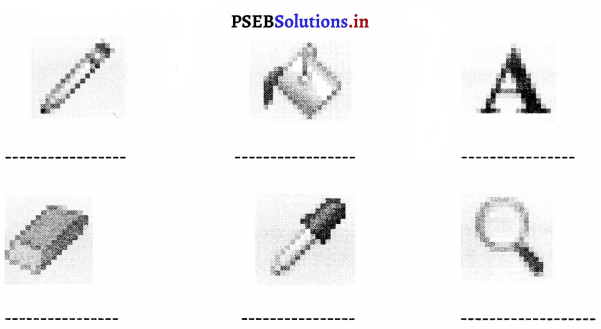
ਉੱਤਰ-
1, ਪੈਂਸਿਲ
2. ਫਿਲ ਵਿਦ ਕਲਰ
3. ਟੈਕਸਟ
4. ਇਰੇਜ਼ਰ
5. ਕਲਰ ਪਿਕਰ
6. ਮੈਗਨੀਫਾਇਰ ।
ਇਹਨਾਂ ਸ਼ੇਪਸ ਦੇ ਨਾਂ ਲਿਖੋ-
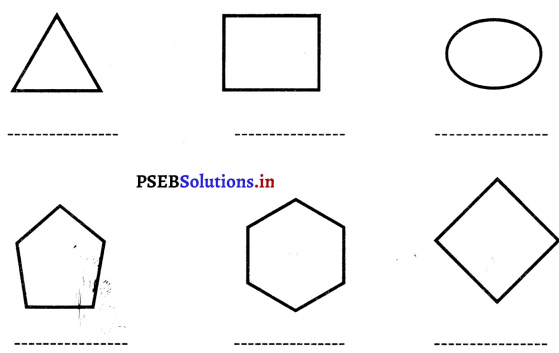
ਉੱਤਰ-
1. ਤ੍ਰਿਭੁਜ (Triangle)
2. ਆਇਤ (Rectangle)
3. ਓਵਲ (Oval)
4. ਪੈਂਟਾਗਨ (Pentagon)
5. ਹੈਕਸਾਗਨ (Hexagon)
6. ਡਾਇਮੰਡ (Diamond) ।
![]()
PSEB 6th Class Computer Guide ਤੇ ਐੱਮ. ਐੱਸ. ਪੈਂਟ (ਭਾਗ-2) Important Questions and Answers
1. ਖ਼ਾਲੀ ਥਾਂਵਾਂ ਭਰੋ
(i) ਹੋਮ ਟੈਬ ਰਿਬਨ ………………….. ਦੇ ਹੇਠਾਂ ਹੁੰਦਾ ਹੈ ।
(ਉ) ਮੀਨੂੰ ਬਾਰ
(ਅ) ਸਟੇਟਸ ਬਾਰ
(ੲ) ਵਰਕ ਏਰੀਆ
(ਸ) ਸਕਰੋਲ ਬਾਰ ।
ਉੱਤਰ-
(ਉ) ਮੀਨੂੰ ਬਾਰ
(ii) …………………….. ਦੀ ਵਰਤੋਂ ਤਸਵੀਰ ਦਾ ਹਿੱਸਾ ਮਿਟਾਉਣ ਵਾਸਤੇ ਕੀਤੀ ਜਾਂਦੀ ਹੈ ।
(ਉ) ਕਲਰ
(ਅ) ਸਿਲੈਂਕਟ
(ੲ) ਇਰੇਜ਼ਰ
(ਸ) ਪੈਂਸਿਲ ।
ਉੱਤਰ-
(ੲ) ਇਰੇਜ਼ਰ
(iii) ਕਰੌਪ ਬਟਨ ਦੀ ਸ਼ੇਪ ……………………. ਵਰਗੀ ਹੁੰਦੀ ਹੈ ।
(ਉ) ਡਾਇਮੰਡ
(ਅ) ਪੈਂਟਾਗਨ
(ੲ) ਵਰਗ
(ਸ) ਆਇਤ ।
ਉੱਤਰ-
(ਉ) ਡਾਇਮੰਡ
(iv) ਪੈਂਟਾਗਨ ਸ਼ੇਪ ਦੀਆਂ ……………………….. ਭੁਜਾਵਾਂ ਹੁੰਦੀਆਂ ਹਨ ।
(ਉ) 3
(ਅ) 4
(ੲ) 5
(ਸ) 6.
ਉੱਤਰ-
(ੲ) 5
2. ਬਹੁਤ ਛੋਟੇ ਉੱਤਰਾਂ ਵਾਲੇ ਪ੍ਰਸ਼ਨ
ਪ੍ਰਸ਼ਨ 1.
ਕਲਿੱਪ ਬੋਰਡ ਵਿੱਚ ਕਿਹੜੇ ਆਪਸ਼ਨ ਹੁੰਦੇ ਹਨ ?
ਉੱਤਰ-
ਕੱਟ, ਕਾਪੀ ਅਤੇ ਪੇਸਟ ।
![]()
ਪ੍ਰਸ਼ਨ 2.
ਸਿਲੈੱਕਸ਼ਨ ਵਿੱਚ ਕਿਹੜੇ-ਕਿਹੜੇ ਆਪਸ਼ਨ ਹੁੰਦੇ ਹਨ ?
ਉੱਤਰ-
Crop, Resize ਅਤੇ Rotate Flip ।
ਪ੍ਰਸ਼ਨ 3.
ਫਿਲ ਵਿਦ ਕਰ ਕੀ ਹੁੰਦਾ ਹੈ ?
ਉੱਤਰ-
ਫਿਲ ਵਿਦ ਕਲਰ ਨਾਲ ਕਿਸੇ ਖੇਤਰ ਨੂੰ ਇੱਕ ਰੰਗ ਨਾਲ ਭਰਿਆ ਜਾ ਸਕਦਾ ਹੈ ।
3. ਛੋਟੇ ਉੱਤਰਾਂ ਵਾਲੇ ਪ੍ਰਸ਼ਨ
ਪ੍ਰਸ਼ਨ 1.
ਫਰੀ ਫੋਰਮ ਸਿਲੈਂਕਸ਼ਨ ਦੀ ਜ਼ਰੂਰਤ ਕਦੋਂ ਪੈਂਦੀ ਹੈ ?
ਉੱਤਰ-
ਫਰੀ ਫੋਰਮ ਸਿਲੈੱਕਸ਼ਨ ਦੀ ਜ਼ਰੂਰਤ ਉਦੋਂ ਪੈਂਦੀ ਹੈ ਜਦੋਂ ਅਸੀਂ ਡਰਾਇੰਗ ਦੇ ਉਸ ਹਿੱਸੇ ਨਾਲ ਕੰਮ ਕਰਨਾ ਹੋਵੇ ਜੋ ਕਈ ਚੀਜ਼ਾਂ ਨਾਲ ਘਿਰਿਆ ਹੋਵੇ ਅਤੇ ਅਸੀਂ ਉਹਨਾਂ ਹਿੱਸਿਆਂ ਨੂੰ ਸ਼ਾਮਿਲ ਨਹੀਂ ਕਰਨਾ ਚਾਹੁੰਦੇ ।
ਪ੍ਰਸ਼ਨ 2.
ਕਰੌਪ ਬਟਨ ਬਾਰੇ ਜਾਣਕਾਰੀ ਦਿਉ ।
ਉੱਤਰ-
ਸਿਲੈਂਕਸ਼ਨ ਆਪਸ਼ਨ ਵਿੱਚ ਸਭ ਤੋਂ ਉੱਪਰ ਜੋ ਬਟਨ ਹੁੰਦਾ ਹੈ ਉਸਨੂੰ ਕਰੌਪ ਕਿਹਾ ਜਾਂਦਾ ਹੈ । ਇਸਦੀ ਵਰਤੋਂ ਤਸਵੀਰ ਨੂੰ ਕਰੋਪ ਕਰਨ ਵਾਸਤੇ ਕੀਤੀ ਜਾਂਦੀ ਹੈ ।
ਪ੍ਰਸ਼ਨ 3.
ਇਨਵਰਟ ਕਲਰ ਆਪਸ਼ਨ ਕੀ ਕਰਦੀ ਹੈ ?
ਉੱਤਰ-
ਇਨਵਰਟ ਕਲਰ ਆਪਸ਼ਨ ਇੱਕ ਕਾਲੇ ਰੰਗ ਦੇ ਮਾਸਕ ਵਿੱਚ ਚਿੱਟੇ ਅੱਖਰਾਂ ਨੂੰ ਬਣਾਉਣ ਵਿੱਚ ਮੱਦਦ ਕਰਦੀ ਹੈ, ਤਾਂ ਜੋ ਉਹ ਟੈਕਸਟ ਸ਼ਾਨਦਾਰ ਲਿਖਿਆ ਦਿਖਾਈ ਦੇਵੇ ।
ਪ੍ਰਸ਼ਨ 4.
ਪੈਂਨਸਿਲ ਟੂਲ ਕਿਸ ਤਰ੍ਹਾਂ ਕੰਮ ਕਰਦਾ ਹੈ ?
ਉੱਤਰ-
ਪੈਂਨਸਿਲ ਟੂਲ ਦੀ ਵਰਤੋਂ ਸੁਤੰਤਰ ਲਾਈਨ ਲਗਾਉਣ ਲਈ ਕੀਤੀ ਜਾਂਦੀ ਹੈ ਜਾਂ ਫਿਰ ਪੈਂਨਸਿਲ ਦੀ ਵਰਤੋਂ ਜੁਮ ਇੰਨ ਵਿਊ ਵਿੱਚ ਪਿਕਸਲ ਵਜੋਂ ਟੈਕਸਟ ਨੂੰ ਐਡਿਟ ਕਰਨ ਲਈ ਕੀਤੀ ਜਾਂਦੀ ਹੈ ।
![]()
ਪ੍ਰਸ਼ਨ 5.
ਮੈਗਨੀਫਾਇਰ ਟੂਲ ਬਾਰੇ ਦੱਸੋ ।
ਉੱਤਰ-
ਮੈਗਨੀਫਾਇਰ ਟੂਲ ਦੀ ਵਰਤੋਂ ਤਸਵੀਰ ਨੂੰ ਜ਼ੂਮ ਇੰਨ ਕਲਰ ਵਾਸਤੇ ਕੀਤੀ ਜਾਂਦੀ ਹੈ । ਇਸ ਨਾਲ ਤਸਵੀਰ ਨੂੰ ਨਜ਼ਦੀਕ ਤੋਂ ਦੇਖਿਆ ਜਾ ਸਕਦਾ ਹੈ ।
ਪ੍ਰਸ਼ਨ 6.
ਹੋਮ ਟੈਬ ਰਿਬਨ ਕੀ ਹੁੰਦਾ ਹੈ ?
ਉੱਤਰ-
ਹੋਮ ਟੈਬ ਰਿਬਨ, ਐੱਮ.ਐੱਸ. ਪੇਂਟ ਦਾ ਇੱਕ ਮੁੱਖ ਰਿਬਨ ਹੈ ਜੋ ਕਿ ਪੇਟ ਵਿੰਡੋ ਵਿੱਚ ਮੀਨੂੰ ਬਾਰ ਦੇ ਹੇਠਾਂ ਮੌਜੂਦ ਹੁੰਦਾ ਹੈ । ਇਸ ਵਿੱਚ ਕਲਿੱਪ ਬੋਰਡ, ਇਮੇਜ਼, ਟੂਲਜ਼, ਬੁਰਸ਼, ਸ਼ੇਪ, ਸਾਈਜ਼ ਅਤੇ ਕਲਰ ਮੀਨੂੰ ਹੁੰਦੇ ਹਨ ।
ਪ੍ਰਸ਼ਨ 7.
ਹੋਮ ਟੈਬ ਰਿਬਨ ਦੇ ਮੁੱਖ ਭਾਗਾਂ ਦੇ ਨਾਮ ਲਿਖੋ ।
ਉੱਤਰ-
ਹੋਮ ਟੈਬ ਰਿਬਨ ਦੇ ਮੁੱਖ ਭਾਗ ਕਲਿਪ ਬੋਰਡ, ਇਮੇਜ਼, ਟੂਲਜ਼, ਬੁਰਸ਼, ਸ਼ੇਪ, ਸਾਈਜ਼ ਅਤੇ ਕਲਰ ਮੀਨੂੰ ਹੁੰਦੇ ਹਨ ।
ਪ੍ਰਸ਼ਨ 8.
ਟੂਲ ਵਿੱਚ ਮੌਜੂਦ ਟੂਲਜ਼ ਦੇ ਨਾਮ ਲਿਖੋ ।
ਉੱਤਰ-
ਟੂਲ ਮੀਨੂੰ ਵਿੱਚ ਹੇਠ ਲਿਖੇ ਟੂਲਜ਼ ਹੁੰਦੇ ਹਨ-
- ਪੈਂਨਸਿਲ
- ਫਿਲ ਵਿਦ ਕਲਰ
- ਟੈਕਸਟ ਟੂਲ
- ਇਰੇਜ਼ਰ
- ਕਲਰ ਪਿੱਕਰ
- ਮੈਗਨੀਫਾਇਰ
- ਬੁਰਸ਼ ।
ਪ੍ਰਸ਼ਨ 9.
ਸਾਈਜ਼ ਟੂਲ ਕੀ ਹੁੰਦਾ ਹੈ ?
ਉੱਤਰ-
ਸਾਈਜ਼ ਟੂਲ ਉਹ ਟੂਲ ਹੈ ਜਿਸ ਦੀ ਮੱਦਦ ਨਾਲ ਬੁਰਸ਼ ਦੀ ਮੋਟਾਈ ਦੀ ਚੋਣ ਕੀਤੀ ਜਾਂਦੀ ਹੈ ।
![]()
ਪ੍ਰਸ਼ਨ 10.
ਬੁਰਸ਼ ਬਾਰੇ ਦੱਸੋ ।
ਉੱਤਰ-
ਬੁਰਸ਼ ਦੀ ਮੱਦਦ ਨਾਲ ਵੱਖ-ਵੱਖ ਮੋਟਾਈ ਅਤੇ ਟੈਕਸਚਰ ਦੀਆਂ ਲਾਈਨਾਂ ਲਗਾਈਆਂ ਜਾ ਸਕਦੀਆਂ ਹਨ ।


